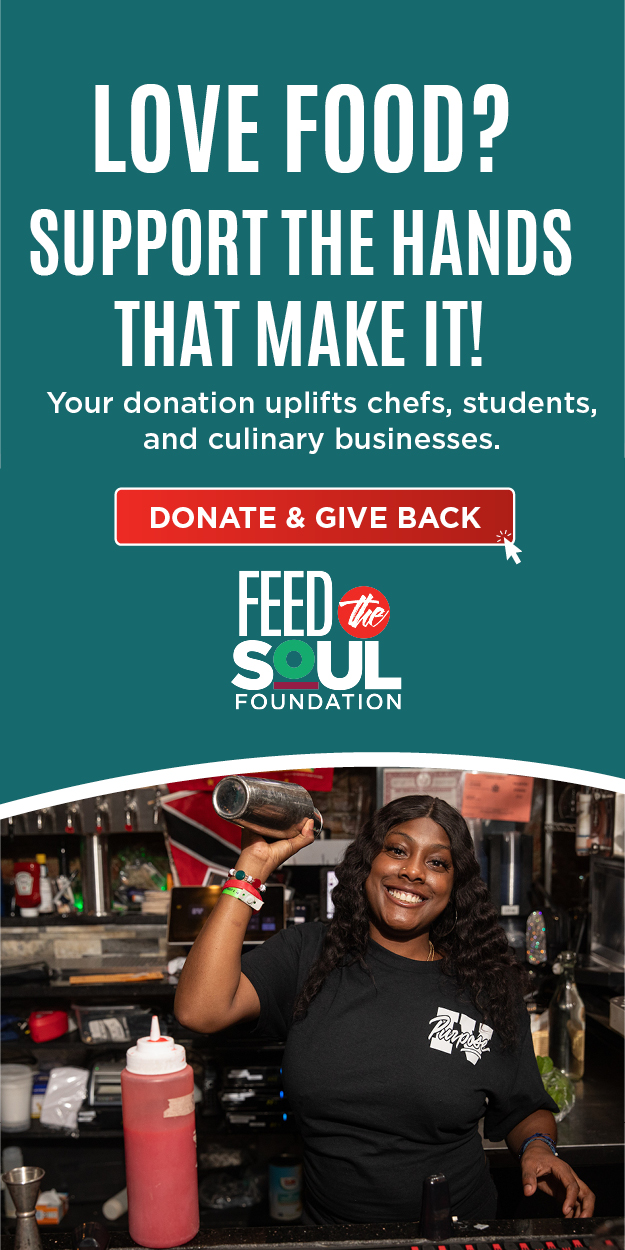By Ryan Nickerson
Securing funds to expand a food-based business – and knowing what, exactly, to spend them on – can be difficult. Especially during a global pandemic. Should investments go toward delivery or dine-in infrastructure? Is the supply chain stable? Will there be a whole new set of COVID-related rules by Spring?
Adding to those concerns, natural disasters and structural challenges have created a need for businesses to not only get funding for expansion, but for rebuilding and recovering the basics. It’s a bumpy road that, according to the numbers, can get even bumpier for marginalized business owners.
For example: Black entrepreneurs are nearly three times more likely than their white counterparts to miss out on business growth and profitability due to a lack of financial capital. They also hold higher levels of student debt, which has been shown to inhibit entrepreneurship by discouraging risk.
Women, in particular, often find themselves scrounging for the financial scraps of their male counterparts. In 2018, women, who make up roughly half the population, had a mere 2.2% share of the $130 billion given out in venture capital that year. And, according to a 2015 report, 61% of Black women self-funded their total start-up capital.
The disparities are also evident for Latino business owners. Even though they are the fastest growing segment of U.S. small businesses, they still struggle to secure capital from national banks.
For restaurateurs, that’s where being a savvy grant seeker becomes invaluable.

Grants vs. Other Funding Methods
Although there were a number of grants that popped up throughout the COVID-19 pandemic, they are not common in the restaurant world, says Joy M. Hutton, principal consultant of Joy of Consulting. Most restaurants seek funding from banks or unconventional lending institutions, like the U.S. Department of the Treasury’s Community Development Financial Institutions Fund, which invests federal money to support economically disadvantaged communities.
Unlike most funding methods, however, grants offer one major advantage.
“Grants are free money,” says Shannen Tune, owner of Craft Burger Food Truck and recipient of the Feed the Soul Foundation’s Business Development Grant Program. He was able to use the funds to continue marketing his business with high-definition pictures and staying up to date on social media trends. “The only thing it will cost you is time.”
But as a busy entrepreneur and restaurateur, that time should be spent as efficiently as possible. To help make the most of the investment, we talked to a few experts to hear what advice they had for marginalized culinary business owners who want to win at the grant game.
5 Tips for Getting Restaurant Grants
1) Do your research
Looking for grants isn’t always as straightforward as simply Googling “grant opportunities.” According to Hutton, restaurant owners who are looking for available grants should contact their local restaurant association, like the Texas Restaurant Association, for the most accurate and up-to-date information. Connecting to local and federal associations can not only help business owners learn about funding opportunities but also inform them about changing laws and anything that is affecting small businesses.
Grants are given out year-round as well, so business owners shouldn’t feel pressured to submit grant applications all in one season.

Joy Hutton, Principal Consultant of Joy of Consulting
“When you think of grants in the traditional sense, sometimes there are deadlines, some grants have rolling applications,” Hutton says. “So it really just depends on the institution.”
Federal grants have a limited amount of funds that require applications to be submitted relatively quickly. She suggested looking at the grant deadlines to see if there is more than one opportunity to submit an application.
Hutton also said to look out for how many grants the entity is giving away.
“If I see that they’re only giving out five grants, I may not waste my time with that,” Hutton said.
It doesn’t take hiring a consultant to find grants either.
“Its not like there are a lot of restaurant grants available so that’s not worth getting a consultant for,” Hutton said. “If you are submitting applications for federal grants and things like that then you may want to hire somebody to help you with those applications because those are longer.”

2) Be thorough and organized
When it comes to the financial sector, making sure your business’ numbers and records are as organized and as “clean” as possible can help grant administrators quickly understand your business.
“This is what helped me with my grants. When it came to the financial aspects and having all the reports I needed to have, it was simple for me,” Tune said. “I already had my books together.”
Hutton says that grant applications typically look for profit and loss statements, tax returns from the previous three years, and any personnel records if the business has employees. Hutton says the easiest and most efficient way to gather this information is to use Quickbooks or get an accountant.
“People just put stuff in drawers and file cabinets and they forget about it,” Hutton said. “Having employee records, financial documents and statements as digital and hard copies is very important.”
Dr. Asheli Atkins, one of the executive directors of the Feed the Soul Foundation, reiterates the need for a basic understanding of your businesses’ finances for the Feed The Soul Restaurant Business Development Grant Program.
“We really take a deep dive into your finances for about two months of the program,” Atkins said. “So when they’re applying, we’re going to ask them for income statements. They need to have that and start collecting and preparing the information before they open up the application.”

3) Be creative
Some grants want to know exactly how your business started- the perfect avenue for those business owners to showoff their creativity and storytelling techniques.
“Unless it’s a federal grant where you are just ticking off boxes, most grants want to know how you started, what are you going to use the money for, and why?” Hutton said. “They want to know about the founder, the restaurant’s board, the owner of the restaurant, what’s your story? How did you get into this business? They also want to know your work history too.”
Hutton said that having your business featured in local media does not necessarily help you in securing a grant.
“Visibility is great, but I wouldn’t say that it enhances your chances of getting a grant,” Hutton said. “Usually when people are looking at grants, they’re looking at- do you have a real need for this money? They’re looking at the overall business- is it something that aligns with their initiative and who they want to support.”
In any case, telling your story requires creativity. It’s recommended business owners consult friends and/or professional writers for proofreading to make sure you are telling your story in the most clear and engaging way.
4) Stay persistent and engaged
Staying engaged with a grant application can be the difference in securing an opportunity others may miss out on. Taking the time to slowly go over your application and be alert for any follow-up questions the grant may require will be crucial.
“You have to stay on top of it,” Tune said. Even with the Feed The Soul application, you have to fill it out in a certain amount of time and that leads to another questionnaire. It’s not just a click and hope money shows up, you’re going to have to stay on top of it and make sure they have all the information they could need from you.”
Having a digital presence is also key, Hutton said, in regards to staying engaged. If you’re still seeking funding, don’t shut down your digital presence, keep your audience engaged and show how your business impacts others.
“Share your story, share what you’re passionate about, have other people share their stories and experiences about the restaurant because it’s all about the storytelling,” Hutton said.
5) Have a solid plan
A grant isn’t just to pay bills- it requires a vision for what exactly you are going to do with the money.
“Time is slow right now, everyone is in the same circumstance,” Tune said. “What makes your circumstance more dire than the next person? Or are you just asking for money because you need it? You need a really good plan for the money.”
Most restaurants use grant funding to pay for overhead costs, Hutton said. Paying for staff, inventory, food, and one of the biggest expenses- rent.
“Grant money is mostly going to go towards any operational expenses,” Hutton said. “and then you have marketing as well that people put money into so they can continue to remain visible to the public.”
Apply for the Feed the Soul Foundation’s Restaurant Business Development Grant Program
The Feed the Soul Foundation, the non-profit arm of Black Restaurant Week, LLC, was created in early 2021 to support marginalized restaurant entrepreneurs and educate them financially and professionally through its Restaurant Business Development Grant Program. The program awards twenty-five small businesses with a $10,000 stipend to make sure they are staying up to date in an unpredictable world with constantly changing guidelines and trends.
In addition to the stipend, grant winners will also participate in a six-month financial education program where financial consultants help work through their finances. They are also paired with industry experts for menu consultation and go through marketing training to help them promote themselves to ensure their businesses have high-quality images.
“People are operating heavily online through social media — things like Grub Hub — we want to make sure people can find them on Facebook, people can find them on Google,” Dr. Atkins said. “We can definitely say that this program really raises the bar of the type of quality images and content that our businesses are putting out there in the area of marketing.”
The program is tailored to what the grant winners need. Grant applicants are asked when applying to identify three goals they want to accomplish and why they want to focus on those goals.
“That helps us to align them with different consultants based on their goals,” Atkins said.
Tune, one of the 2021 recipients, believes the educational component is potentially more beneficial than the stipend for his business. Although the stipend has helped him market his business, he believes the financial education program can help him sustain his business for the long term.
“People will give you money and grants but won’t show you how to use it,” Tune said. “Feed The Soul showed us how to use the money.”
“I think a lot of Black-owned businesses are not necessarily bank ready- they don’t know what banks are looking for,” Tube continued. “The class was taught by a banker from a Black-owned bank, and he basically said: this is what we’re looking for, this is what your credit needs to look like, this is what your business plan needs to look like.”



